Setting up a technology center requires more than computers, connectivity, and enthusiasm. This is worth saying out loud because we at Ushahidi Liberia underestimated just how much more was needed to get iLab Liberia up and running.
Here are a few of the must-haves we discovered in setting up this tech lab – we’d love to hear yours!
Must-have #1: great signage
Did you know you need flashy signs that can be seen from far away? In a place like Liberia where presentation is everything, this is key – and can take a bit of work considering that there are several people involved in the process. For the metal street signs, first find a reliable and talented sign painter - who will often provide the scrap metal in addition to his artwork. When the artist is finished, a welder will attach the sign to iron rods, and someone else (often friendly security guards) will insert the sign in the ground with concrete footing. The artist then comes back, retouches the sign and, ta-da, you’ve made your mark. For the large tarp banners, there is thankfully a very professional printer in town that created ours for a pretty penny.
[caption id="attachment_4243" align="aligncenter" width="398" caption="Signage on the main road"]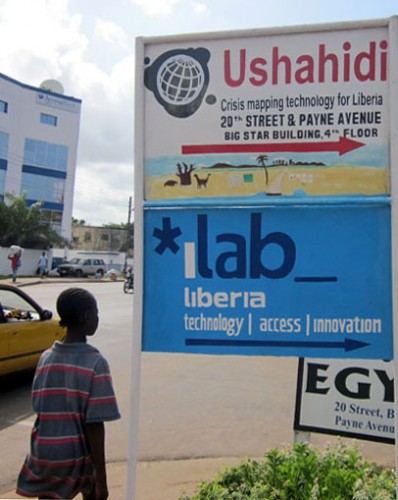 [/caption]
[caption id="attachment_4245" align="aligncenter" width="439" caption="iLab Liberia and Ushahidi Liberia's office"]
[/caption]
[caption id="attachment_4245" align="aligncenter" width="439" caption="iLab Liberia and Ushahidi Liberia's office"]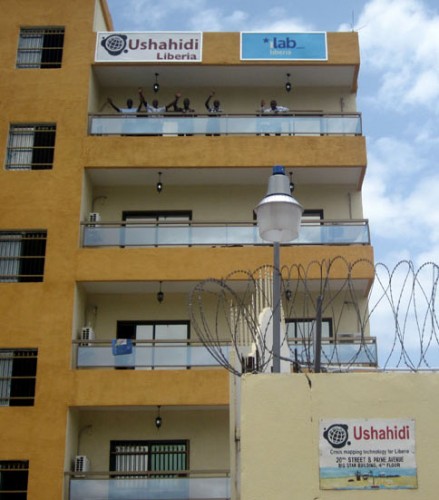 [/caption]
The lesser-known benefit of the handmade signs is the artist interpretation of the logo – note how there is a two-headed animal on Ushahidi’s signboard where there were originally two giraffes.
[caption id="attachment_4244" align="aligncenter" width="450" caption="Ushahidi Liberia's two-headed mascot"]
[/caption]
The lesser-known benefit of the handmade signs is the artist interpretation of the logo – note how there is a two-headed animal on Ushahidi’s signboard where there were originally two giraffes.
[caption id="attachment_4244" align="aligncenter" width="450" caption="Ushahidi Liberia's two-headed mascot"]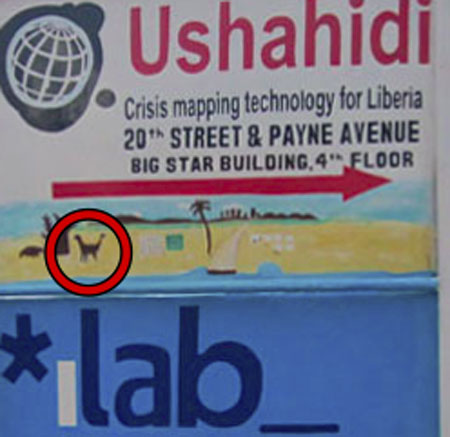 [/caption]
Must-have #2: user guidelines
As our team talked about iLab’s target audience and the absence of another open tech space in Liberia, we realized we should set some ground rules. These rules may seem obvious and potentially restrictive for users, but we’ve found that having them on the walls and reading through them with users before each training session or event (as well as having regular users sign a detailed MoU) has increased the professionalism of the space and the users’ respect for it.
[caption id="attachment_4247" align="aligncenter" width="525" caption="iLab Liberia's top ten guidelines"]
[/caption]
Must-have #2: user guidelines
As our team talked about iLab’s target audience and the absence of another open tech space in Liberia, we realized we should set some ground rules. These rules may seem obvious and potentially restrictive for users, but we’ve found that having them on the walls and reading through them with users before each training session or event (as well as having regular users sign a detailed MoU) has increased the professionalism of the space and the users’ respect for it.
[caption id="attachment_4247" align="aligncenter" width="525" caption="iLab Liberia's top ten guidelines"]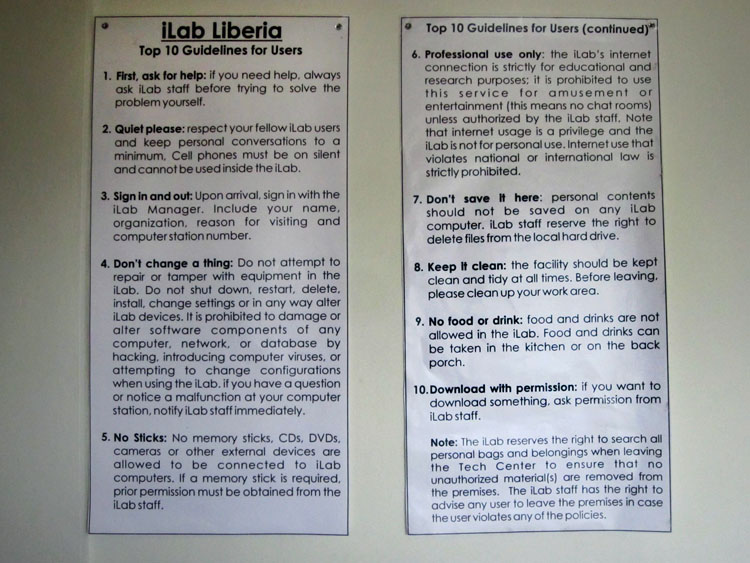 [/caption]
Must-have #3: a clear mission
In developing our guidelines, we realized that, while iLab was modeled on the inspirational iHub, its mission and target audience sometimes diverged from iHub’s open space for “techpreneurs”. The iLab’s mission is to assist IT professionals, organizations and institutions in their efforts to more readily share information using ICT – specifically, with trainings in open source tools and systems because they promote interactive communities and shared ownership in a country where information and knowledge are often withheld or at least difficult to access.
[caption id="attachment_4249" align="aligncenter" width="500" caption="Training at iLab"]
[/caption]
Must-have #3: a clear mission
In developing our guidelines, we realized that, while iLab was modeled on the inspirational iHub, its mission and target audience sometimes diverged from iHub’s open space for “techpreneurs”. The iLab’s mission is to assist IT professionals, organizations and institutions in their efforts to more readily share information using ICT – specifically, with trainings in open source tools and systems because they promote interactive communities and shared ownership in a country where information and knowledge are often withheld or at least difficult to access.
[caption id="attachment_4249" align="aligncenter" width="500" caption="Training at iLab"]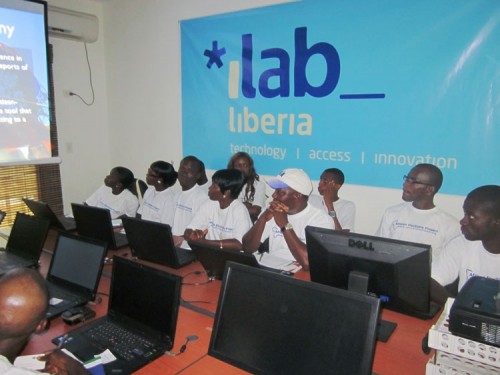 [/caption]
The keywords here are “training”, and “lab” vs. “hub” – the iLab is available for use by appointment and is a community workspace in so far as users may attend events and training sessions for free; it is not a space where, pending membership, users have their own workspace and are granted greater access based on innovation.
The tech community in Liberia is not yet robust enough, by our estimates, to make full use of an iHub; for now, introductions to open source and popular info sharing tools, along with contextually specific trainings based on local techies’ requests, provide structure for the iLab’s pilot phase. More inline with iHub, we also want iLab to be a meet-up space for the young tech community and for workshops with a similar mission that have technical requirements.
Must-have #4: limited Internet access
Another must for our budding iLab is restricted Internet access. This, like the guidelines, could come across as a distrustful policy. Our reasoning: we would rather start out the reduced temptation for users to stray while simultaneously modeling a new policy (in Liberia) towards Internet usage in professional spaces. This means no Facebook, Yahoo chat, YouTube (with some exception), and blocks on popular sports sites.
Must-have #5: online, not just on the ground
Any new tech lab needs an online presence – and not just a website, but also Twitter, blog, Facebook (and surely more). Starting with the website, we wanted to walk the walk by using a free Google sites template (iLab intends to host Google site trainings) with content by Liberians for Liberians. The blog will be a space for details about starting and maintaining a tech lab in Liberia, as well as recommendations from iLab’s staff about different applications and resources for local techies.
[caption id="attachment_4248" align="aligncenter" width="500" caption="iLab's first workshop with the African Elections Project"]
[/caption]
The keywords here are “training”, and “lab” vs. “hub” – the iLab is available for use by appointment and is a community workspace in so far as users may attend events and training sessions for free; it is not a space where, pending membership, users have their own workspace and are granted greater access based on innovation.
The tech community in Liberia is not yet robust enough, by our estimates, to make full use of an iHub; for now, introductions to open source and popular info sharing tools, along with contextually specific trainings based on local techies’ requests, provide structure for the iLab’s pilot phase. More inline with iHub, we also want iLab to be a meet-up space for the young tech community and for workshops with a similar mission that have technical requirements.
Must-have #4: limited Internet access
Another must for our budding iLab is restricted Internet access. This, like the guidelines, could come across as a distrustful policy. Our reasoning: we would rather start out the reduced temptation for users to stray while simultaneously modeling a new policy (in Liberia) towards Internet usage in professional spaces. This means no Facebook, Yahoo chat, YouTube (with some exception), and blocks on popular sports sites.
Must-have #5: online, not just on the ground
Any new tech lab needs an online presence – and not just a website, but also Twitter, blog, Facebook (and surely more). Starting with the website, we wanted to walk the walk by using a free Google sites template (iLab intends to host Google site trainings) with content by Liberians for Liberians. The blog will be a space for details about starting and maintaining a tech lab in Liberia, as well as recommendations from iLab’s staff about different applications and resources for local techies.
[caption id="attachment_4248" align="aligncenter" width="500" caption="iLab's first workshop with the African Elections Project"]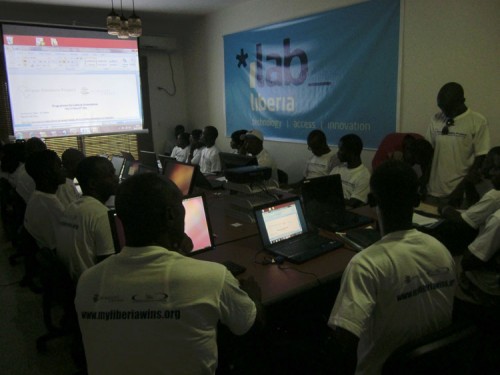 [/caption]
Last week, iLab Liberia hosted its first Ushahidi training for a dozen West Africa Network for Peacebuilding in Liberia’s (WANEP) field reporters and regional representatives, following WANEP’s launch of a national early warning system. We also hosted PenPlusBytes, a Ghanian non-profit, for a two-day workshop at the iLab where 30 Liberian reporters and social workers received in-depth training in ICT journalism for the upcoming election.
[caption id="attachment_4250" align="aligncenter" width="500" caption="Ushahidi training at African Elections project workshop"]
[/caption]
Last week, iLab Liberia hosted its first Ushahidi training for a dozen West Africa Network for Peacebuilding in Liberia’s (WANEP) field reporters and regional representatives, following WANEP’s launch of a national early warning system. We also hosted PenPlusBytes, a Ghanian non-profit, for a two-day workshop at the iLab where 30 Liberian reporters and social workers received in-depth training in ICT journalism for the upcoming election.
[caption id="attachment_4250" align="aligncenter" width="500" caption="Ushahidi training at African Elections project workshop"]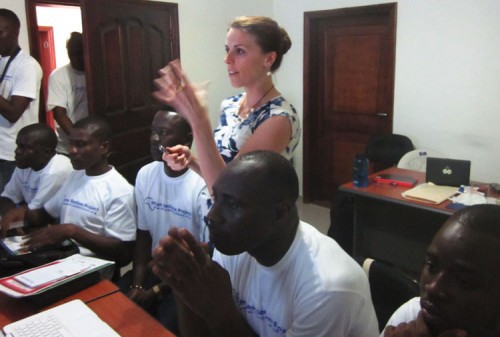 [/caption]
[caption id="attachment_4251" align="aligncenter" width="500" caption="Carter Draper going over the iLab's guidelines with workshop participants"]
[/caption]
[caption id="attachment_4251" align="aligncenter" width="500" caption="Carter Draper going over the iLab's guidelines with workshop participants"]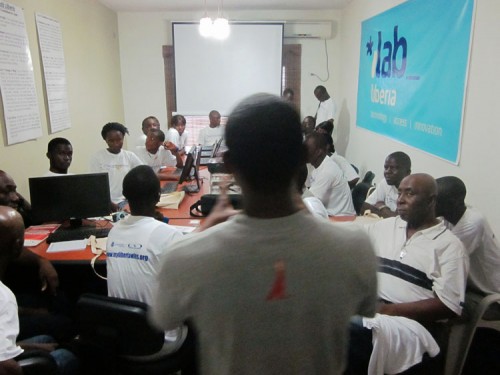 [/caption]
At the end of the training, which will be one in a series from PenPlusBytes known as the “African Elections Project”, the iLab was gifted an additional laptop to add to the lab’s 11 computers; now, local media have a dedicated computer in the iLab for reporting on the election process. The events were a thrilling success, and the feedback was more than enough motivation for the iLab team to continue refining our approach and spreading the word about what iLab has to offer.
To learn more must-haves – along with more details about iLab’s environment – check out IT Director Kpetermeni Siakor’s recent iLab blog post.
[/caption]
At the end of the training, which will be one in a series from PenPlusBytes known as the “African Elections Project”, the iLab was gifted an additional laptop to add to the lab’s 11 computers; now, local media have a dedicated computer in the iLab for reporting on the election process. The events were a thrilling success, and the feedback was more than enough motivation for the iLab team to continue refining our approach and spreading the word about what iLab has to offer.
To learn more must-haves – along with more details about iLab’s environment – check out IT Director Kpetermeni Siakor’s recent iLab blog post.
 [/caption]
[caption id="attachment_4245" align="aligncenter" width="439" caption="iLab Liberia and Ushahidi Liberia's office"]
[/caption]
[caption id="attachment_4245" align="aligncenter" width="439" caption="iLab Liberia and Ushahidi Liberia's office"] [/caption]
The lesser-known benefit of the handmade signs is the artist interpretation of the logo – note how there is a two-headed animal on Ushahidi’s signboard where there were originally two giraffes.
[caption id="attachment_4244" align="aligncenter" width="450" caption="Ushahidi Liberia's two-headed mascot"]
[/caption]
The lesser-known benefit of the handmade signs is the artist interpretation of the logo – note how there is a two-headed animal on Ushahidi’s signboard where there were originally two giraffes.
[caption id="attachment_4244" align="aligncenter" width="450" caption="Ushahidi Liberia's two-headed mascot"] [/caption]
Must-have #2: user guidelines
As our team talked about iLab’s target audience and the absence of another open tech space in Liberia, we realized we should set some ground rules. These rules may seem obvious and potentially restrictive for users, but we’ve found that having them on the walls and reading through them with users before each training session or event (as well as having regular users sign a detailed MoU) has increased the professionalism of the space and the users’ respect for it.
[caption id="attachment_4247" align="aligncenter" width="525" caption="iLab Liberia's top ten guidelines"]
[/caption]
Must-have #2: user guidelines
As our team talked about iLab’s target audience and the absence of another open tech space in Liberia, we realized we should set some ground rules. These rules may seem obvious and potentially restrictive for users, but we’ve found that having them on the walls and reading through them with users before each training session or event (as well as having regular users sign a detailed MoU) has increased the professionalism of the space and the users’ respect for it.
[caption id="attachment_4247" align="aligncenter" width="525" caption="iLab Liberia's top ten guidelines"] [/caption]
Must-have #3: a clear mission
In developing our guidelines, we realized that, while iLab was modeled on the inspirational iHub, its mission and target audience sometimes diverged from iHub’s open space for “techpreneurs”. The iLab’s mission is to assist IT professionals, organizations and institutions in their efforts to more readily share information using ICT – specifically, with trainings in open source tools and systems because they promote interactive communities and shared ownership in a country where information and knowledge are often withheld or at least difficult to access.
[caption id="attachment_4249" align="aligncenter" width="500" caption="Training at iLab"]
[/caption]
Must-have #3: a clear mission
In developing our guidelines, we realized that, while iLab was modeled on the inspirational iHub, its mission and target audience sometimes diverged from iHub’s open space for “techpreneurs”. The iLab’s mission is to assist IT professionals, organizations and institutions in their efforts to more readily share information using ICT – specifically, with trainings in open source tools and systems because they promote interactive communities and shared ownership in a country where information and knowledge are often withheld or at least difficult to access.
[caption id="attachment_4249" align="aligncenter" width="500" caption="Training at iLab"] [/caption]
The keywords here are “training”, and “lab” vs. “hub” – the iLab is available for use by appointment and is a community workspace in so far as users may attend events and training sessions for free; it is not a space where, pending membership, users have their own workspace and are granted greater access based on innovation.
The tech community in Liberia is not yet robust enough, by our estimates, to make full use of an iHub; for now, introductions to open source and popular info sharing tools, along with contextually specific trainings based on local techies’ requests, provide structure for the iLab’s pilot phase. More inline with iHub, we also want iLab to be a meet-up space for the young tech community and for workshops with a similar mission that have technical requirements.
Must-have #4: limited Internet access
Another must for our budding iLab is restricted Internet access. This, like the guidelines, could come across as a distrustful policy. Our reasoning: we would rather start out the reduced temptation for users to stray while simultaneously modeling a new policy (in Liberia) towards Internet usage in professional spaces. This means no Facebook, Yahoo chat, YouTube (with some exception), and blocks on popular sports sites.
Must-have #5: online, not just on the ground
Any new tech lab needs an online presence – and not just a website, but also Twitter, blog, Facebook (and surely more). Starting with the website, we wanted to walk the walk by using a free Google sites template (iLab intends to host Google site trainings) with content by Liberians for Liberians. The blog will be a space for details about starting and maintaining a tech lab in Liberia, as well as recommendations from iLab’s staff about different applications and resources for local techies.
[caption id="attachment_4248" align="aligncenter" width="500" caption="iLab's first workshop with the African Elections Project"]
[/caption]
The keywords here are “training”, and “lab” vs. “hub” – the iLab is available for use by appointment and is a community workspace in so far as users may attend events and training sessions for free; it is not a space where, pending membership, users have their own workspace and are granted greater access based on innovation.
The tech community in Liberia is not yet robust enough, by our estimates, to make full use of an iHub; for now, introductions to open source and popular info sharing tools, along with contextually specific trainings based on local techies’ requests, provide structure for the iLab’s pilot phase. More inline with iHub, we also want iLab to be a meet-up space for the young tech community and for workshops with a similar mission that have technical requirements.
Must-have #4: limited Internet access
Another must for our budding iLab is restricted Internet access. This, like the guidelines, could come across as a distrustful policy. Our reasoning: we would rather start out the reduced temptation for users to stray while simultaneously modeling a new policy (in Liberia) towards Internet usage in professional spaces. This means no Facebook, Yahoo chat, YouTube (with some exception), and blocks on popular sports sites.
Must-have #5: online, not just on the ground
Any new tech lab needs an online presence – and not just a website, but also Twitter, blog, Facebook (and surely more). Starting with the website, we wanted to walk the walk by using a free Google sites template (iLab intends to host Google site trainings) with content by Liberians for Liberians. The blog will be a space for details about starting and maintaining a tech lab in Liberia, as well as recommendations from iLab’s staff about different applications and resources for local techies.
[caption id="attachment_4248" align="aligncenter" width="500" caption="iLab's first workshop with the African Elections Project"] [/caption]
Last week, iLab Liberia hosted its first Ushahidi training for a dozen West Africa Network for Peacebuilding in Liberia’s (WANEP) field reporters and regional representatives, following WANEP’s launch of a national early warning system. We also hosted PenPlusBytes, a Ghanian non-profit, for a two-day workshop at the iLab where 30 Liberian reporters and social workers received in-depth training in ICT journalism for the upcoming election.
[caption id="attachment_4250" align="aligncenter" width="500" caption="Ushahidi training at African Elections project workshop"]
[/caption]
Last week, iLab Liberia hosted its first Ushahidi training for a dozen West Africa Network for Peacebuilding in Liberia’s (WANEP) field reporters and regional representatives, following WANEP’s launch of a national early warning system. We also hosted PenPlusBytes, a Ghanian non-profit, for a two-day workshop at the iLab where 30 Liberian reporters and social workers received in-depth training in ICT journalism for the upcoming election.
[caption id="attachment_4250" align="aligncenter" width="500" caption="Ushahidi training at African Elections project workshop"] [/caption]
[caption id="attachment_4251" align="aligncenter" width="500" caption="Carter Draper going over the iLab's guidelines with workshop participants"]
[/caption]
[caption id="attachment_4251" align="aligncenter" width="500" caption="Carter Draper going over the iLab's guidelines with workshop participants"] [/caption]
At the end of the training, which will be one in a series from PenPlusBytes known as the “African Elections Project”, the iLab was gifted an additional laptop to add to the lab’s 11 computers; now, local media have a dedicated computer in the iLab for reporting on the election process. The events were a thrilling success, and the feedback was more than enough motivation for the iLab team to continue refining our approach and spreading the word about what iLab has to offer.
To learn more must-haves – along with more details about iLab’s environment – check out IT Director Kpetermeni Siakor’s recent iLab blog post.
[/caption]
At the end of the training, which will be one in a series from PenPlusBytes known as the “African Elections Project”, the iLab was gifted an additional laptop to add to the lab’s 11 computers; now, local media have a dedicated computer in the iLab for reporting on the election process. The events were a thrilling success, and the feedback was more than enough motivation for the iLab team to continue refining our approach and spreading the word about what iLab has to offer.
To learn more must-haves – along with more details about iLab’s environment – check out IT Director Kpetermeni Siakor’s recent iLab blog post.